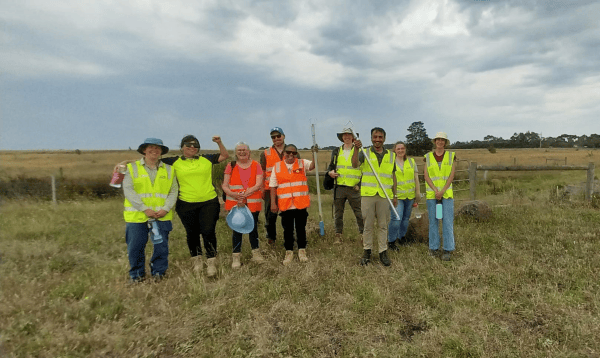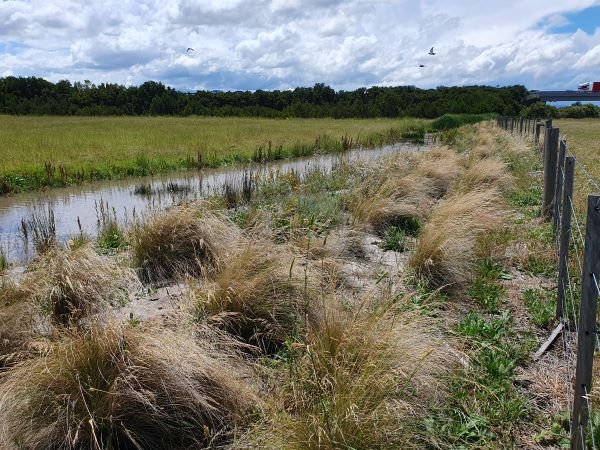Just a short walk from Curly Sedge Creek, a new kind of farm is growing: one that’s as focused on caring for Country as it is on growing plants.
Wollert Community Farm is an exciting partnership between Whittlesea Community Connections and Yarra Valley Water, developed with the support of Melbourne Polytechnic and the City of Whittlesea, one of Merri Creek Management Committee’s six member councils. The farm is designed as a place where community, conservation and cultivation meet: combining social enterprise, environmental education, First Nations-led activities, local food growing, and hands-on restoration of the land.
At MCMC we love hearing the ways that our fellow Merri Creek catchment lovers are caring for Merri tributaries – including the little-known Curly Sedge Creek, where we have ambitious plans, that support, align with and extend those of the Wollert Community Farm.
 Wollert Community Farm's nugal biik conservation volunteers. Photo by Julia Cirillo
Wollert Community Farm's nugal biik conservation volunteers. Photo by Julia Cirillo
“The farm project has evolved over time,” explains the farm’s Conservation Lead Charlotte Gordon. “It started when Whittlesea Community Connections was looking for land to grow food for our relief work. We approached Yarra Valley Water, who were open to making better use of the buffer land around their Aurora Sewage Treatment Plant facility. We're not growing food yet – just native plants – but the thread that connects all our activities is bringing communities back into public spaces like buffer land and shifting how large landholders think about its potential.”
Wollert Community Farm are an important part of our vision for Curly Sedge Creek: as experts in the indigenous species of the area, we will turn to them when we’re ready to plant the seedlings we need to restore habitat at Curly Sedge Creek by planting out areas that are currently overrun with invasive species.
Rehabilitating a special place
One key priority for the farm is rehabilitating Curly Sedge Creek. Degraded by years of overgrazing and invasive weeds, the creek is now the focus of an expanding program of revegetation, weed control and ecological monitoring. This effort is being led by the farm’s nugal biik conservation volunteers.
“Part of my role is co-ordinating the volunteer group, and a couple of years ago we did our first planting. Last year we did infill planting, and this year is our first year of expanding out of that space,” says Charlotte. “We’ve collected Curly Sedge seed from across the creek, grown it in the nursery, and then replanted it. We’ve also worked with contractors to remove Spiny Rush, and are now moving into more consistent monitoring so we can understand what’s really going on here.”
Monitoring water-quality has been an important part of that work. With support from MCMC’s WaterWatch Coordinator Julia Cirillo, Wollert Community Farm set up regular monitoring activities that provide critical new data from a previously under-sampled part of the Merri Creek catchment.
“It’s the furthest-north WaterWatch group we have in the catchment,” says Julia. “We didn’t have much long-term data from up there, so it’s great to now be building up a picture of the creek’s condition over time, including salinity, nutrients, pH, and dissolved oxygen. With Charlotte leading the group, we know the data is reliable, even as volunteers come and go.”
“We also know how important it is that communities love their local waterways. Many people wouldn’t know that Curly Sedge Creek exists – it’s tucked away out of view of the nearby industrial and residential estates. Unfortunately, it’s low profile is part of its vulnerability – which is one of the things we’re asking people’s support to change: Curly Sedge Creek needs to be known, loved and protected by its local people. Charlotte has made a great start to community building through her work at the Wollert Community Farm.”
Find out how you can help to grow the work of people like Charlotte at Curly Sedge Creek here.
 Photograph by Charlotte Gordon
Photograph by Charlotte Gordon
On the lookout for Growling Grass Frogs
Other forms of monitoring have followed the work of Charlotte and her group. Last summer, MCMC’s Michael Longmore visited the farm and demonstrated how to set up a reptile survey – laying out equipment along Curly Sedge Creek and the nearby stony knoll. The team at the farm is now also looking to expand their monitoring to include Growling Grass Frogs.
“We’ve spoken with an expert who told us they need quite large pools,” says Charlotte. “It’s not clear yet if our section of the creek is suitable, but we’re hoping to get funding to bring someone in – perhaps MCMC again – who can show us how to run surveys. Then we’ll be able to take it on ourselves and make it part of our ongoing work to improve habitat for them.”
With the farm recently moving from a temporary site into new, purpose-built premises that include greenhouses, shade houses and a seed production area with capacity for up to 400,000 plants, the team’s ability to undertake vital conservation work is set to grow in the years ahead.
“In terms of species at the nursery that are going to be outplanted, we have been focusing on poa (also known as meadow grass or tussock grass),” says Charlotte. “We trialled about 20 species in the first year, which allowed us to identify which ones are best suited to the area. We’ve also got plants like Milky Beauty-heads (Calocephalus lacteus) and we’d love to get more Salt Marsh Rush (Juncus Kraussi) in to replace the Spiny Rush.”
These efforts are already attracting interest and support from the broader community. Last year, Friends of Merri Creek came for a site visit, collecting seed and helping plant out Curly Sedge along the creek. “There’s always this beautiful chorus of admiration when someone sees a Curly Sedge for the first time,” Charlotte laughs. “It’s so curly that it’s very distinctive and cute – people love it.”
Conservation is rarely a solo effort, and at Curly Sedge Creek, the work of restoring landscapes and protecting water quality is being strengthened through partnership. By sharing knowledge, exchanging skills, and building capacity, the Wollert Community Farm team and their collaborators are helping to build a community of care around this vital Merri Creek tributary.
To find out more about MCMC’s work at Curly Sedge Creek, click here.





 Merri Creek Management Committee. 2 Lee St, East Brunswick, Victoria, Australia 3057
Merri Creek Management Committee. 2 Lee St, East Brunswick, Victoria, Australia 3057